Last week university students all around the country graduated while decked out in caps, gowns and their best outfits.
Re: News went along to one of Victoria University of Wellington’s graduation parades to ask graduates why they chose to wear cultural clothing to celebrate finishing their degrees.

Photo: Re: News.
Marina Suban Na Ayudtaya
Today I am wearing a traditional Thai skirt.
It’s usually worn with a sbai which is a top that goes across the body but I thought it would be more practical to not wear the top half since I’ll be walking the parade.
Since I was 16 I’ve wanted to wear a traditional Thai dress for prom but they’re actually really hard to get in New Zealand so I got this shipped from Thailand for graduation.
The skirt itself cost around $500 and the entire outfit cost around $1000.
I moved to New Zealand when I was five and my family still lives in Thailand.
My outfit means representing my family at graduation and showing where I am from.
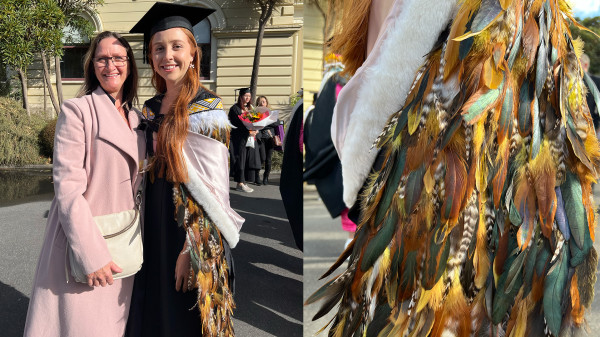
Photo: Re: News.
Imogen Fox
Imogen: I whakapapa to Ngāti Toa Rangatira.
[My whatu kākahu], it’s brand new, my mum got it made for this graduation — the first in the family so we’re starting a new tradition.
Imogen’s mum: It's made up North and I designed it myself with the meaning of who [Imogen] is as a person.
She just brings mana to our whānau, she's strong, she's a leader, she’s beautiful inside and out.
Her strength and her determination to get through everything is amazing, it’s what has gotten her this far.
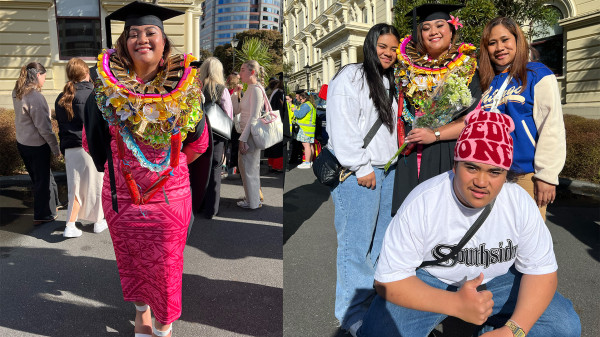
Photo: Re: News.
Shekyna Lolouta
I’m wearing a Sāmoan dress. I got this from the shop Panikeke [in Porirua], it was a last minute choice and it's the first time I’m wearing this kind of design.
I’m also wearing lolly lei which we always made for special events growing up. They acknowledge the hard work of the person who is graduating.
I’m showcasing my culture and also embracing who I am. I'm full Sāmoan and I was born and raised there 14 years before I moved to New Zealand.
I’m the first child to graduate from tertiary education and I can see how proud my family are for me. I’ve got my siblings here with me today.
My parents brought my papa here from Sāmoa last week as a surprise for me which means a lot because of the sacrifices he made for all of us.
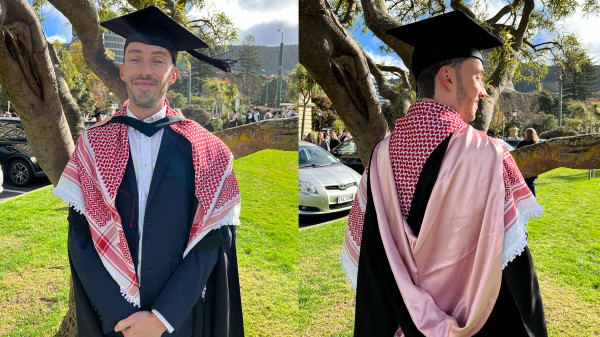
Photo: Re: News.
Brad Aldridge
Graduation is a moment to define who you are as an adult and who you are going to make yourself into. I want to be someone that cares about the world.
I’m wearing a Palestinian keffiyeh in support of the students in Gaza who could not graduate, who couldn’t have a future. It's in honour of them.
I whakapapa to England and Scotland, primarily.
This cultural clothing is not my own but I think having shared cultures and shared causes that we connect to is important when we are graduating.
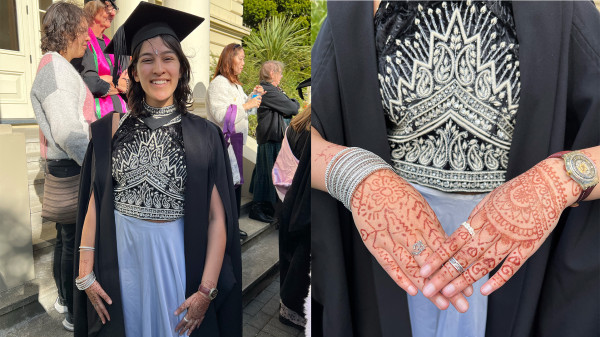
Photo: Re: News.
Tia Bhana
I’m wearing a lehenga and I chose to wear it because it’s pretty and it makes me feel more connected to my culture.
My ba (grandmother) is from Gujarat in India and my mum was raised in South Africa and then moved to New Zealand.
I got to do mehendi for graduation — my mum did a hand and I did a hand. It feels more special that I get to look pretty today wearing something that is very cultural and not so Western.
The outfit is my mum’s and it's from India. My mum is out there in the graduation parade and I think she feels very proud.
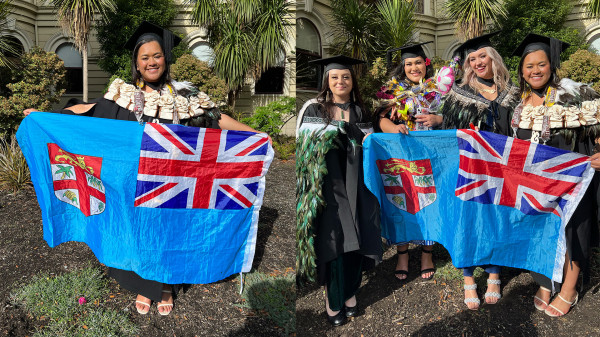
Photo: Re: News.
Dianna Revell
My father is from Te Ātihaunui-a-Pāpārangi and my mother is from [Fiji].
Today is such a momentous day, not just for me but for the village that raised me.
I hold this [Fijian] flag with such great pride as a way of carrying them with me.

Photo: Re: News.
Anis Latif (left)
We are wearing two different kinds of traditional wear from Malaysia.
It feels surreal, I am so proud to wear my home country’s clothes in a foreign country.
I’ve been receiving compliments, people have been saying it's so pretty and modest. I'm loving it.
More stories:
Not every Māori cloak is a korowai: Māori cloaks explained
“Kākahu Māori are a beautiful visual expression of Māori identity.”
An employment lawyer on what you need to know before your first job
Contracts, pay negotiation, HR and more.
Dental dams make oral sex safer. Why don’t we use them more?
If you’ve never heard of dental dams before, you’re not the only one.